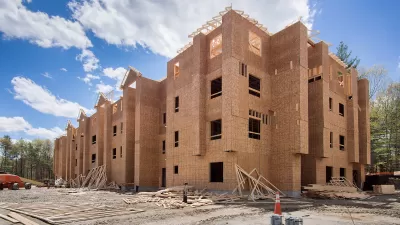With the backing of powerful nonprofit and for-profit investors, the Housing Partnership Equity Trust is making waves with its triple bottom line approach to affordable housing. More importantly, it’s making money.

Armed with funding from the private sector, the Housing Partnership Alliance is pioneering a new way to create affordable homes and stave off gentrification. Their Housing Partnership Equity Trust (HPET) is a for-profit investment vehicle that purchases and retrofits property and then preserves low rents. By leveraging financial clout alongside the neighborhood know-how of local housing nonprofits, the HPET can compete with major developers to close property deals.
The article discusses the HPET’s newest acquisition, Damen Court on the Near West Side of Chicago, which it purchased for approximately $15 million. For each project, HPET partners with a local nonprofit, in this case the Hispanic Housing Development Corporation. By preserving affordability and increasing energy efficiency in its properties, the HPET pursues a triple bottom line investment strategy: profit, social justice, and environmental sustainability.
The HPET has received investment backing from Ford and Prudential along with credit from Citibank and Morgan Stanley. In spite of several challenges, including a rate of return that is hovering 2.5% below the average for U.S. real estate investment trusts, the HPET is making money. Leadership appear confident the trust can sustain itself long-term. Although the HPET collaborative system is still experimental, it may prove to be a profitable way to preserve mixed-income urban communities.
FULL STORY: Using Wall Street Tactics to Preserve Affordable Housing

Alabama: Trump Terminates Settlements for Black Communities Harmed By Raw Sewage
Trump deemed the landmark civil rights agreement “illegal DEI and environmental justice policy.”

Planetizen Federal Action Tracker
A weekly monitor of how Trump’s orders and actions are impacting planners and planning in America.

Why Should We Subsidize Public Transportation?
Many public transit agencies face financial stress due to rising costs, declining fare revenue, and declining subsidies. Transit advocates must provide a strong business case for increasing public transit funding.

Understanding Road Diets
An explainer from Momentum highlights the advantages of reducing vehicle lanes in favor of more bike, transit, and pedestrian infrastructure.

New California Law Regulates Warehouse Pollution
A new law tightens building and emissions regulations for large distribution warehouses to mitigate air pollution and traffic in surrounding communities.

Phoenix Announces Opening Date for Light Rail Extension
The South Central extension will connect South Phoenix to downtown and other major hubs starting on June 7.
Urban Design for Planners 1: Software Tools
This six-course series explores essential urban design concepts using open source software and equips planners with the tools they need to participate fully in the urban design process.
Planning for Universal Design
Learn the tools for implementing Universal Design in planning regulations.
Caltrans
Smith Gee Studio
Institute for Housing and Urban Development Studies (IHS)
City of Grandview
Harvard GSD Executive Education
Toledo-Lucas County Plan Commissions
Salt Lake City
NYU Wagner Graduate School of Public Service





























